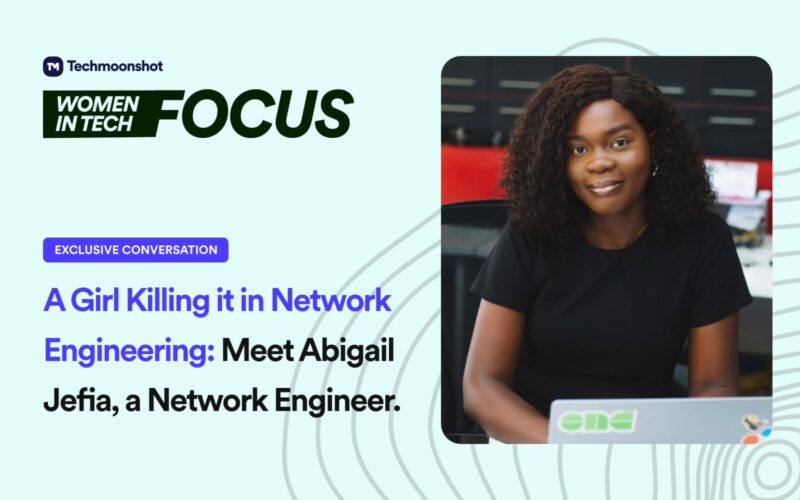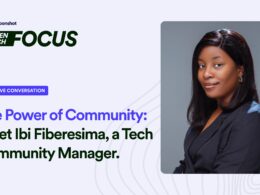In today’s episode of “Women in Tech Focus,” we had the honor of chatting with an outstanding techie who is not only making waves in the tech industry but is also set to be an Olympic torchbearer at this year’s Summer Olympics in Paris, France. Let’s dive in.
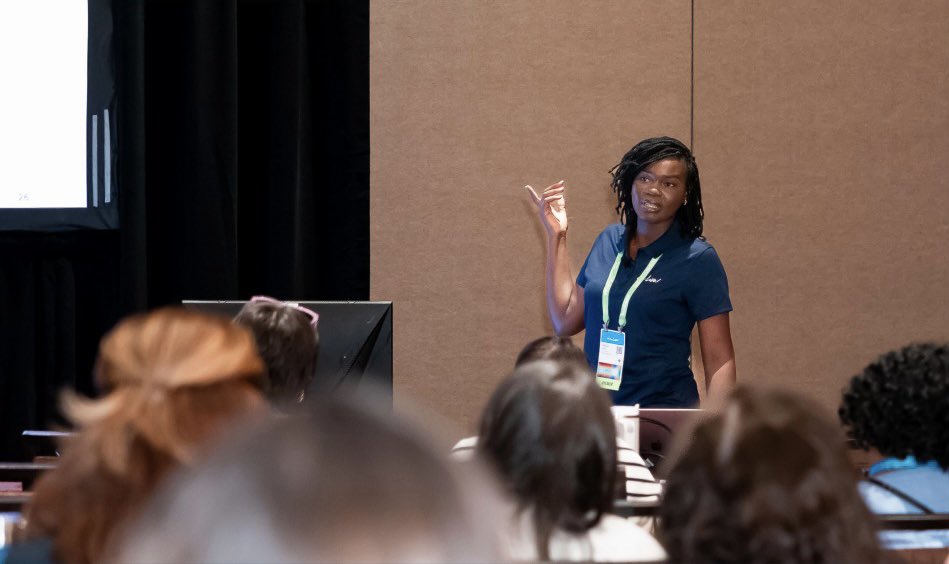
Can we get to know you?
I see myself as someone deeply passionate about both people and technology, though that description barely scratches the surface. Delving deeper, my journey has been shaped by a profound enthusiasm for technology, with several years of experience in Network Engineering. Currently, I am making strides as an IIoT Solutions Engineer at Cisco, where I work collaboratively with stakeholders to craft Industrial IoT-focused architectures for customers spanning Europe, the Middle East, and Africa.
Before stepping into my role in the sales team, I served as a Consulting Engineer at Cisco. In this position, I was dedicated to designing and implementing software-defined solutions to enhance customer network infrastructures across the Middle East and Africa.
My commitment to sharing knowledge has led me to publish articles on Artificial Intelligence/Machine Learning and Software-Defined Networking. I’ve also had the privilege of presenting these topics at international conferences in the United States and Canada. However, my contributions to these conferences extend beyond technical discussions; I am deeply committed to empowering young professionals to realize their potential. A highlight of my speaking engagements includes an Inclusive Futures session at Cisco Live in Las Vegas in 2023, where I emphasized the importance of building strong sponsorship relationships for career acceleration.
My passion for people is reflected in my volunteer work, particularly in two initiatives close to my heart. I proudly lead the Nigerian chapter of the Cisco Women in Science and Engineering (WISE) ERO, through which we hold events to encourage and inspire young girls and women to pursue STEM careers. Additionally, I am passionate about closing the gender gap in network engineering, leading me to establish a community that offers mentoring and training for women aiming to achieve their CCNA (Cisco Certified Network Associate) certification at no cost.
My efforts in promoting diversity and inclusion have not gone unnoticed, as I was recently honored by my organization as a diversity and inclusion trailblazer. I am incredibly proud and excited to represent Cisco as a torchbearer in the Paris 2024 Olympics torch relay.
Outside of my professional and volunteer commitments, I find joy in life’s simpler pleasures: spending quality time with my family and friends, enjoying movies and animations, and dreaming of traveling the world to embark on culinary adventures.
The internet connects the world, and you help build the bridges! Can you tell us about your journey to becoming a network engineer?
Many people assume that my career path was a straight arrow toward network engineering, believing I always knew where I was heading. However, the truth is that my journey was anything but straightforward. The decision-making process, though brief, was layered with complexity. I explored various technology domains, including software engineering, cloud computing, artificial intelligence/machine learning, cybersecurity, and finally, networking. Ironically, network engineering became a refuge from the intricacies of software development and programming.
My first real encounter with networking occurred during a technical academy course I took over a long holiday break in my second year of university. Despite the initial confusion, I found the subject deeply fascinating. This interest was further nurtured in my third year through a CCNA course offered at my university, and by my fourth year, I was deepening my knowledge and skills through an internship at a networking firm. It was there, amidst hands-on experience and achieving my CCNA certification, that I set a goal for myself: to become a Network Consultant at Cisco within ten years. Surprisingly, that dream materialized much sooner than I anticipated, as I joined Cisco as a Network Consulting Engineer just two years after setting that goal.
Did you have any role models or mentors who influenced your career path?
I wouldn’t say I had a specific role model or mentor while deciding on a career path, but what I did have was something incredibly valuable: a robust support system. I was surrounded by people genuinely invested in my personal and professional development, which I consider one of the greatest gifts one can receive. Regardless of whether I leaned toward a career in fashion, entertainment, law, or network engineering, I was confident they would support me wholeheartedly.
While I admired numerous female leaders I saw on LinkedIn or in the news, aspiring to impact others as they did, none directly influenced my choice of network engineering as a career. That decision was entirely mine. However, as I sought to progress in my career, I did cultivate mentorship and sponsorship relationships that provided me with invaluable insights and skills for career growth. For instance, transitioning to Industrial IoT was facilitated significantly by these relationships. So, in essence, while these mentors were pivotal in advancing my career within the path I had chosen, they didn’t play a direct role in determining that path.
Can you tell a bit about your educational background and any relevant certifications you’ve obtained so far?
I’m someone who was determined to fully utilize my bachelor’s degree, and that’s precisely what I’ve accomplished. At Covenant University, where I pursued Information and Communication Engineering, I was exposed to a variety of fields within technology. This exposure sparked my ambition to delve into these areas further. During my fourth year at university, I achieved my CCNA certification, followed by the CompTIA Security+ during my National Youth Service Corps (NYSC) period. My journey with Cisco began when I joined their graduate academy program, where I successfully completed the CCNP Enterprise and DevNet Associate exams as part of the program’s requirements. Beyond these, I’ve earned specialist certifications in SD-WAN and ISE. Currently, my focus has shifted towards Network Automation, as I’m preparing for the DevNet Professional certification and aim to pursue the DevNet Expert certification in the future.
You navigate a complex world of networks. Can you explain, in layman’s terms, the biggest challenge you face in your day-to-day work?
Working in the intricate world of network engineering involves the continuous cycle of unlearning, learning, and relearning to stay abreast of rapidly evolving technology trends. The challenge of keeping up is magnified by the fact that I both work and study remotely, demanding a high degree of self-discipline and motivation to maintain optimal performance while also dedicating time to my passion for encouraging young women to consider careers in Network Engineering. My role requires devising solutions for clients across diverse regions, each with its unique network architecture, technical proficiency, and business needs. This diversity necessitates a flexible approach to adapt to various technical environments and comprehend distinct requirements, ensuring my effectiveness and success in delivering tailored networking solutions.
Given your expertise in both network engineering and Industrial IoT, how do you see these two fields working together to create even more innovative solutions?
Interestingly, the fields of enterprise networking and Industrial IoT (Internet of Things) networking are closely related, as both involve the intricacies of network solutions. Previously, my focus was on deploying enterprise network solutions for clients. Now, my role has shifted to recommending Industrial IoT networking solutions tailored to various industrial applications. The skills and insights gained from my experiences with enterprise networking have proven invaluable in identifying and positioning optimal IoT solutions for different industrial use cases. As it stands, enterprise and IoT networking are not just coexisting; they are increasingly integrated, driving the development of innovative solutions. These innovations range from extending Wi-Fi from institutional buildings like schools, government offices, and workplaces to public spaces and homes, to enabling smart cities, smart buildings, smart farms, and the monitoring of diverse functions such as water utilities, vehicle fleets, and assets through sensors. The landscape is ripe with endless possibilities, and there’s a continuous effort to explore and deliver even more groundbreaking solutions.
What are some of the biggest challenges you face in your work as a woman, and how do you overcome them?
Entering the network engineering field, one might anticipate the challenges stemming from its male-dominated nature, and indeed, this was my initial experience. From my first exposure to network engineering during technical classes, through my internship, to my full-time role at Cisco, the gender disparity was evident. Despite encountering numerous women at Cisco making significant strides in network engineering, it’s clear there’s substantial progress yet to be made beyond my immediate environment. My customer-facing roles have frequently placed me in project meetings and technical workshops where I’ve been the sole female among 10-20 participants. Initially, this situation was disheartening; I felt somewhat alienated and hesitated to voice my opinions, concerned about being taken seriously.
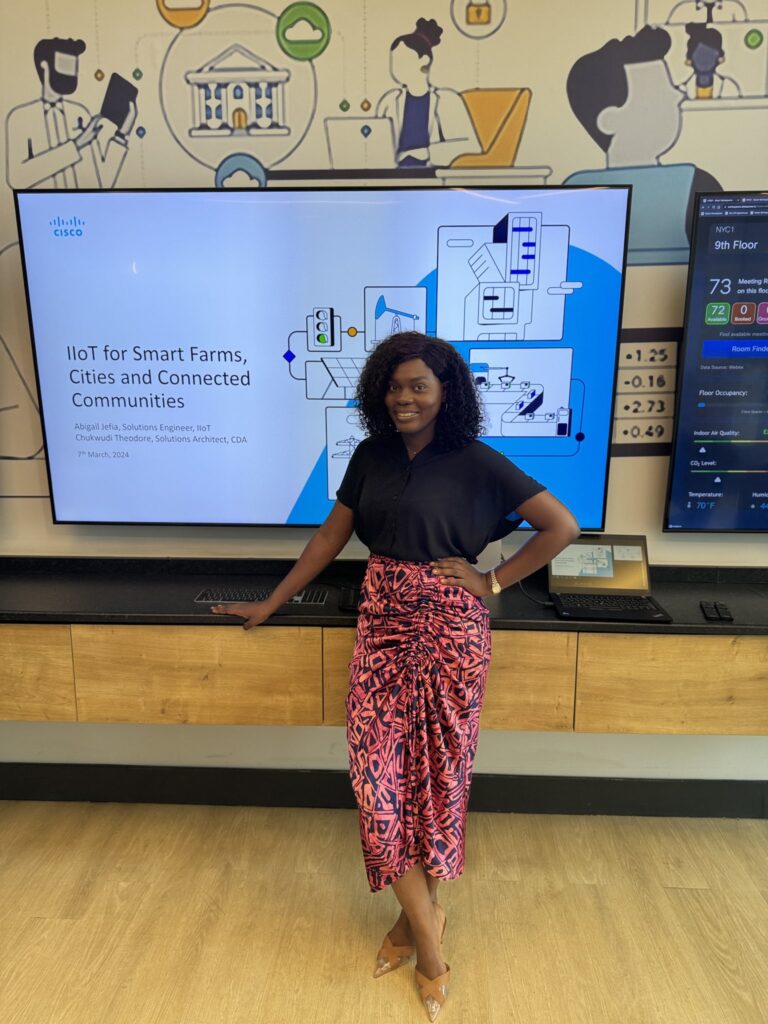
Over time, however, I came to realize that in the realm of problem-solving, gender considerations fall away. In moments of need, the focus shifts to whoever can provide a solution. This insight shifted my focus towards honing my technical skills and personal growth. As I concentrated on my development, my confidence and ability to deliver results grew, allowing me to excel in my role.
What advice can you offer to young women interested in pursuing careers in either network engineering or Industrial IoT? Are there transferable skills they can leverage?
For young women contemplating a career in network engineering or venturing into the Industrial IoT domain, I’d strongly suggest reading my LinkedIn article, “Baking Your Way to Solutions Engineering.” In it, I share my personal journey from starting as a Network Consulting Engineer to becoming an IIoT Solutions Engineer within three years. The article lays out a ‘recipe’ for success in these fields, emphasizing the importance of three essential ingredients: setting clear career goals and aspirations, constantly acquiring relevant knowledge and skills, and building a supportive professional network.
This piece is not just a recount of my career milestones; it’s a roadmap designed to inspire and guide you through your professional journey. I delve into how blending these ingredients helped me navigate my path and achieve my professional aspirations. Whether you’re just starting or looking to pivot into a new tech domain, this article offers valuable insights and practical advice to help you craft your success story.
Are there any specific resources (books, websites, workshops) you’d recommend for someone wanting to learn more about network engineering?
In today’s digital age, the internet is a treasure trove of information, making it incredibly easy to find resources on virtually any topic, including network engineering. For those keen on exploring this field, the wealth of accessible content ranges from free introductory courses to more detailed and advanced training options. Platforms like Cisco’s Skills for All offer a great starting point for novices, providing foundational knowledge without any cost. Meanwhile, YouTube channels such as Kevin Wallace and NetworkChuck serve up a variety of content that caters to both beginners and those with some experience, offering insights and tutorials in an engaging format.
For those ready to invest in their learning, David Bombal’s comprehensive CCNA course on Udemy and the extensive library available on CBT Nuggets are excellent paid resources that delve deeper into the complexities of network engineering. With these resources at your fingertips, anyone genuinely interested in network engineering can embark on a journey of discovery and learning, armed with all the necessary tools to understand what a career in networking entails.
What are some of the misconceptions you encounter about network engineering as a young woman in the field?
Network engineering often gets tagged with misconceptions like ‘It’s a man’s world,’ ‘It’s merely a stepping stone to cybersecurity,’ ‘It’s overly complicated,’ or ‘It lacks innovation.’ These are just some of the notions I’ve encountered when talking to aspiring tech professionals. Unfortunately, such misunderstandings can discourage many from exploring network engineering further. It’s crucial for those interested in technology careers to recognize that many of today’s leading technologies, including cloud computing and cybersecurity, are fundamentally grounded in networking.
Network engineering is not only a pivotal field but also ripe with opportunities for innovation. To change these perceptions and #MakeNetworkEngineeringCoolAgain, network engineers like myself are undertaking various initiatives. I’m personally contributing by building a community focused on introducing more women to the field of networking, assisting them in the certification process, and planning to expand these efforts to include both men and women. Our goal is to dispel these myths and illuminate the dynamic and vital role network engineering plays in the tech landscape.
Is there a specific project you’ve worked on that you’re particularly proud of? Share the story behind it!
Among the many projects I’ve had the privilege to work on, there’s one that stands out for its impact and the challenges we overcame; it involved deploying a comprehensive Industrial IoT solution for a large manufacturing facility. The project aimed to modernize their operations, improve efficiency, and enhance safety.
The journey began with an in-depth analysis of the facility’s existing network infrastructure, identifying the gaps and opportunities for improvement. The challenge was not just the technical aspect but also ensuring the seamless integration of new technologies without disrupting ongoing operations—a critical factor for the client.
Collaboration was key. We worked closely with the facility’s team, combining our expertise in network engineering with their in-depth knowledge of their operational needs. This collaborative approach allowed us to design a tailored IIoT solution that addressed specific pain points, such as real-time monitoring of equipment, predictive maintenance, and enhanced data analytics for better decision-making.
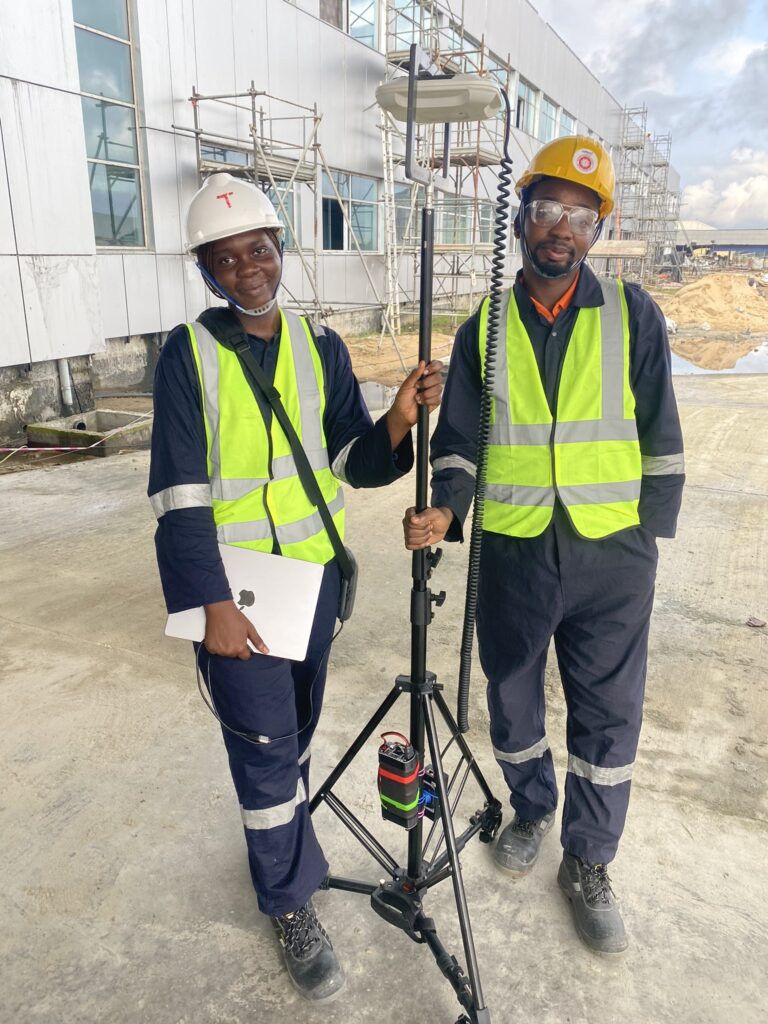
The implementation phase was intense, with a focus on meticulous planning and execution to minimize downtime. Witnessing the transformation as the new system went live was incredibly rewarding. The facility reported significant improvements in operational efficiency, reduced downtime, and a noticeable enhancement in workplace safety.
This project was a testament to the power of teamwork, innovation, and the positive impact technology can have on traditional industries. It underscored the value of Industrial IoT in revolutionizing manufacturing processes, and I am proud to have led a project that not only achieved its goals but also set a benchmark for future endeavors.
Any final words to wrap this up?
There’s one final piece of advice I’ve been emphasizing to young professionals in my recent speaking engagements and mentoring sessions: the importance of building one’s own path to success rather than solely seeking mentorship or association with established leaders in tech. While mentorship can be valuable, there’s a current trend of chasing after connections with every successful figure, which I caution against. I believe strongly in the power of developing oneself to the point where industry experts seek you out, eager to be part of your success story.
Focus on finding your niche and stay committed to it, despite the allure of jumping onto the latest trending topics. Dedication to honing your skills and expanding your knowledge in your chosen area is crucial. It’s about believing in yourself, holding yourself accountable, and being unwavering in your commitment to growth and development. These are the keys to making your mark in today’s world. Remember, everyone wants to be associated with success, but it’s essential to build that success on your own terms, leveraging your unique strengths and passions.
Thank you for sharing your story with us.
Thank you for having me; it’s truly been a delightful experience.






